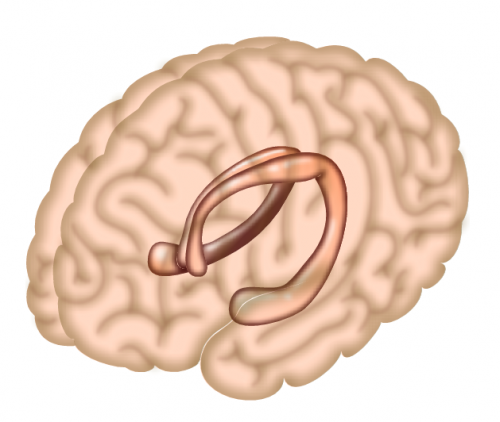June 24, 2014 report
Study results indicate brain structures outside the hippocampus may support face recognition

(Medical Xpress)—A team of neuroscientists and psychologists with members from several universities in the U.S. has found that people with damage to their hippocampus are still able to recognize faces, even when they cannot recognize other objects. In their paper published in Proceedings of the National Academy of Sciences, the team describes five experiments they conducted with volunteer patients that had experienced damage to their hippocampus and what the group found as a result.
Scientists are still struggling to understand how memory is stored in the human brain—some suggest each memory is stored in a single neuron, while others insist memories are spread across groups of neurons or even brain regions. The researchers in this latest study have found evidence that supports the latter view.
To gain a better understanding of how memory is stored, the researchers focused on the hippocampus, the part of the brain where most memory is believed to be held. They conducted five experiments, each involving patients with damage to that part of their brain. The first experiment involved giving 10 patients the standard Recognition and Memory Test for Words and for facial recognition. The second involved six patients from the first experiment, they were asked to try to remember faces presented in black and white or color photographs of male faces along with others of buildings and words. The third experiment involved the same six patients repeating the second experiment only with fewer faces to remember and for shorter amounts of time. The fourth experiment involved the same patients who were asked to study pictures of famous people and then to take a memory test. The final experiment was a remake of the third experiment except the interval between photograph viewing and testing was shorter.
In analyzing the results of all five experiments, the researchers were able to see that many patients with hippocampus damage were able to recognize faces, at least for a short time, despite damage that should have prevented them from doing so—in most cases they were unable to recognize common objects. This, the team suggests, likely indicates that one or more brain structures outside of the hippocampus are involved in face recognition which implies that at least some types of memory in general are indeed spread across brain structures. That means, they add, that damage to individual neurons likely will not cause memory loss.
More information: When recognition memory is independent of hippocampal function, Christine N. Smith, PNAS, doi: 10.1073/pnas.1409878111 . www.pnas.org/content/early/201 … 878111.abstract.html
Abstract
Hippocampal damage has been thought to result in broad memory impairment. Recent studies in humans, however, have raised the possibility that recognition memory for faces might be spared. In five experiments we investigated face recognition in patients with hippocampal lesions (H) or large medial temporal lobe (MTL) lesions, including patients where neurohistological information was available. Recognition of novel faces was unequivocally intact in H patients but only at a short retention interval. Recognition memory for words, buildings, inverted faces, and famous faces was impaired. For MTL patients, recognition memory was impaired for all materials and across all retention intervals. These results indicate that structures other than the hippocampus, perhaps the perirhinal cortex, can support face recognition memory in H patients under some conditions. The fact that the faces were novel when recognition memory was intact does not fully account for our findings. We propose that the role of the hippocampus in recognition memory is related to how recognition decisions are accomplished. In typical recognition tasks, participants proceed by forming an association between a study item and the study list, and the recognition decision is later made based on whether participants believe the item was on the study list. We suggest that face recognition is an exception to this principle and that, at short retention intervals, participants can make their recognition decisions without making explicit reference to the study list. Important features of faces that might make face recognition exceptional are that they are processed holistically and are difficult to verbally label.
© 2014 Medical Xpress
















